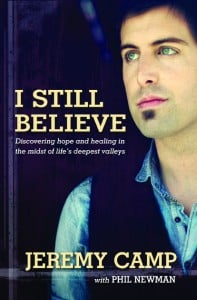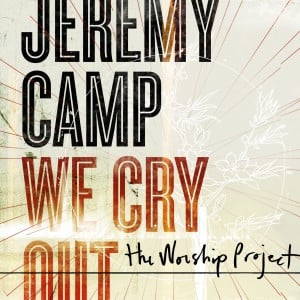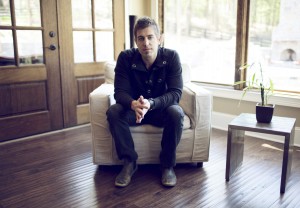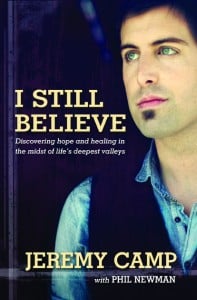Click “Like” to share this with your friends!
Major recording artists are often targeted by fans with equal amounts of adoration and envy. We love what they do and wish we could do it too. Their lives are perfect, after all.
Jeremy Camp might disagree with that last statement. The Dove Award winning singer/songwriter has experienced the pain of losing his first wife to cancer and the grief of losing an unborn child (with second wife Adie) to a miscarriage. But through all the struggles, Camp has found a reservoir of perfect grace to sustain him during those imperfect times.
Camp details his life, including those devastating events, in a new book called I Still Believe. Whole Notes had a chance to catch up with Camp to talked about the book plus other topics such as family, social media and connecting with God:
Chad Bonham: In your book, you talk about how a couple of years ago you were beginning to question whether or not the story of your first wife’s death and how God brought you through that was effective anymore. Now, here you are writing about it in even greater detail than what you could ever share from the stage. What revelation led you to take that step and how has writing about it invigorated your ministry?
 Jeremy Camp: I was praying one day and God literally gave me a song called “Healing Hand of God.” I don’t ever want this just to be a story. Like, “Oh here’s a good story that tells about a triumph over tragedy.” That’s never what I wanted. I want this to be something that’s impactful and it’s real when I tell it. And while I was praying, God literally flooded my mind with these stories from people who have told me, “Thank you for sharing that,” or “That’s just what I went through,” and “I’m thankful for your faithfulness to God.” It was memory after memory. You hear a lot of things throughout the years and you forget a lot of things. But when God was flooding my memory with all these stories, I knew He was saying, “This is still impactful.” It freshened everything up for me. (That story is) not my whole life and you’ll read the book and see stuff that God has done now and things that God has done throughout my life, but this is a part of my life. It’s not my whole life and it’s not all that I share, but it is a part of what God has done through my story. When I realized that, it gave me a confidence and a refreshing and a new take on everything.
Jeremy Camp: I was praying one day and God literally gave me a song called “Healing Hand of God.” I don’t ever want this just to be a story. Like, “Oh here’s a good story that tells about a triumph over tragedy.” That’s never what I wanted. I want this to be something that’s impactful and it’s real when I tell it. And while I was praying, God literally flooded my mind with these stories from people who have told me, “Thank you for sharing that,” or “That’s just what I went through,” and “I’m thankful for your faithfulness to God.” It was memory after memory. You hear a lot of things throughout the years and you forget a lot of things. But when God was flooding my memory with all these stories, I knew He was saying, “This is still impactful.” It freshened everything up for me. (That story is) not my whole life and you’ll read the book and see stuff that God has done now and things that God has done throughout my life, but this is a part of my life. It’s not my whole life and it’s not all that I share, but it is a part of what God has done through my story. When I realized that, it gave me a confidence and a refreshing and a new take on everything.
Bonham: When I last talked to you in about five years ago, you told me how great your wife Adie had been to encourage you to continue talking about Melissa and how strange you thought that was at the time. Since then, the two of you have lost a child due to a miscarriage and in the book, Adie writes how the experience helped her better understand the loss you had felt years earlier. How did that bond the two of you even closer together?
 Camp: There something called sympathy and there’s another thing called empathy. Before, she sympathized with what I went through because she loved me and she thought, “Wow, I couldn’t imagine going through that.” Even though (her miscarriage) wasn’t the same, she did grieve and I grieved too. We were in our second trimester. We were getting all prepared and getting things all ready because we were past the safe zone. It was that feeling of loss and that feeling of losing something you love. And she told me, “I can empathize with you more and really understand what you felt.” It drew us closer. When I was writing the book, she was in there sharing with Phil (Newman), who helped me put this on paper in a better way. For hours and hours we did interviews and talked and she’d be in there with me and I’d sit there and cry and she would sit there and be with me and she would cry with me. It definitely drew us closer and even writing this book drew us closer too.
Camp: There something called sympathy and there’s another thing called empathy. Before, she sympathized with what I went through because she loved me and she thought, “Wow, I couldn’t imagine going through that.” Even though (her miscarriage) wasn’t the same, she did grieve and I grieved too. We were in our second trimester. We were getting all prepared and getting things all ready because we were past the safe zone. It was that feeling of loss and that feeling of losing something you love. And she told me, “I can empathize with you more and really understand what you felt.” It drew us closer. When I was writing the book, she was in there sharing with Phil (Newman), who helped me put this on paper in a better way. For hours and hours we did interviews and talked and she’d be in there with me and I’d sit there and cry and she would sit there and be with me and she would cry with me. It definitely drew us closer and even writing this book drew us closer too.
Bonham: I’ve read that “I Still Believe” was the first song you wrote after Melissa passed.
Camp: It was maybe two weeks after Melissa went to be with the Lord and I remember literally sitting down at my parents’ house and I was just down. I was bumming out, sitting on the couch and just hurting. I remember God saying to me, “Just pick up your guitar.” I remember hearing that specifically. And I was like, “What are you talking about? I don’t want to pick up my guitar right now.” After arguing for a little bit, I finally got my guitar out and I just started writing and what came out was that whole song. It starts off just saying, “Scattered words, empty thoughts, seem to pour from my heart/I’ve never felt so torn before, it seems I don’t know where to start.” But, and then there’s this resolve, “I feel your grace like rain from every fingertip washing away all my pain/I still believe in Your faithfulness/I still believe in Your truth.” It just came out. It was like, “Okay, Lord, I don’t understand, but alright, I’m going to trust You. I still trust Your Word. When I can see and I can’t understand, I’ll still trust You.” And that’s what my resolve was. That song was such a big part of the healing process for me. Even singing it live now, it kind of takes me back to that place more and more in a good way. So I’ll share my testimony through that song. It’s special and I usually do it acoustic now, so it’s very intimate and personal. In the end we kick it in, but it’s always a special moment.
Bonham: What are the challenges you face as a family man that has to spend so much time on the road?

Camp: The difficulty is when I have to leave them, but they come with me sometimes and we home school so the kids can come whenever they want. It’s so cool just to share (my career) with my girls. They pray for me every time I leave and they say, “Dad, go tell people about Jesus.” I come back home and they ask, “Did people hear about Jesus?” And I say, “They did.” And I’ll share that with my kids. It’s huge because they know I’m going out and serving the Lord. I’m going out and dedicating my life to Him. Of course, they know that they are my priority but Jesus is also my priority. Even yesterday, I was talking to one of my daughters and I said, “I love you so much.” And she said, “Even more than Jesus.” And I was like, “No.” But she said, “That’s okay. I know you’re supposed to love Jesus more.” For them to understand that, it’s amazing.
Bonham: Recent research shows that an estimated 90 percent of pregnant women whose unborn child is likely to have Down syndrome go on to end the pregnancy. As the older brother of a sibling with Down syndrome, how sobering is that statistic, and can you imagine life without him?
Camp: Oh my goodness. I couldn’t imagine what it would be like without my brother Josh. So when I hear something like that, it is (sobering). I knew it was a high rate, but that’s the majority of people saying, “No, I don’t want to do it.” And that just blows my mind that people would do that. It’s so sad. Some people think Down syndrome makes it less of a child. No it’s not. God made them perfectly and beautifully. My brother is fearfully and wonderfully made.
Bonham: You talk in your book about the downfalls of social media. How do you balance the positives of such a powerful tool with the negatives and still have that connection with people?
 Camp: For me, even with my Twitter and Facebook, I’m not on it all the time. I don’t Twitter every day. I just think we should be more thoughtful with what we share. I don’t care that you’re turning a light on right now. That’s great and all, but there’s got to be a balance there. (Social media) is great because you can get information out there quick or you can use it as a ministry tool, but when you’re on it all the time and you’re not spending time with people and you’re not sitting there looking at someone in the eyes and asking, “How are you doing?” that’s when it’s out of balance. You might think you’re connecting with your friends on Facebook but when was the last time you went out with your friends and asked them how they were doing? When was the last time you called them and prayed with them and really had a conversation? Go ahead and do those things (with social media). I get it. I really do. But if you’re lacking the other things, that’s when it’s out of balance and you’re not really connected.
Camp: For me, even with my Twitter and Facebook, I’m not on it all the time. I don’t Twitter every day. I just think we should be more thoughtful with what we share. I don’t care that you’re turning a light on right now. That’s great and all, but there’s got to be a balance there. (Social media) is great because you can get information out there quick or you can use it as a ministry tool, but when you’re on it all the time and you’re not spending time with people and you’re not sitting there looking at someone in the eyes and asking, “How are you doing?” that’s when it’s out of balance. You might think you’re connecting with your friends on Facebook but when was the last time you went out with your friends and asked them how they were doing? When was the last time you called them and prayed with them and really had a conversation? Go ahead and do those things (with social media). I get it. I really do. But if you’re lacking the other things, that’s when it’s out of balance and you’re not really connected.
Bonham: Do the potential downfalls that come with relationships via social media serve as an analogy for our relationship with God?

Camp: Oh absolutely. You might get up in the morning and do your devotions and say a few prayers and there you go. You think you’ve done your connecting for the day. But you don’t know how to wait before the Lord and really stop and hear from the Lord or dig deeper and walk throughout the day with the Lord. It’s like sending a quick Tweet or checking your Facebook page real quick. “Hey Lord, what’s going on?” But you’re missing the intimacy of, “Be still and know that I am God.” When you’re reading the Word of God, you need to let it soak in and let God speak to your heart and let the Holy Spirit work. So just like social media, you can think you’re connected to the Lord, but you’re really not.
Bonham: With so many people seeking to fill a void in their hearts with things like social media or even through pop culture idol worship, how can you speak into their lives and let them know that what they’re really looking for a deeper relationship with God?
Camp: That’s exactly what you do. You’ve got to keep pointing them towards Jesus. As long as I’m personally being sensitive to the Lord and I’m spending time with Him, the Holy Spirit does the work. If I’m on stage and ministering my heart and pointing people to Christ, then that’s all I can do. My heart goes out but you can’t force somebody (to understand). That’s when you pray and say, “Holy Spirit, do a work in these people’s hearts and make sure they’re not looking to me.”
Stay up on the latest from Jeremy Camp including touring news by visiting his official website HERE.

